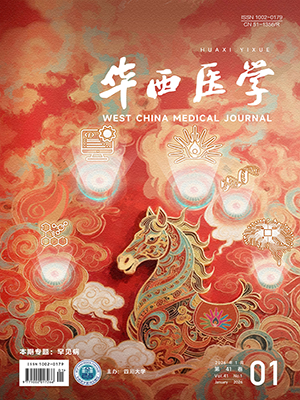【摘要】 目的 探討活動期感染性心內膜炎(infectiue endocarditis,IE)患者心臟手術的最佳時期。 方法 回顧分析1999年9月-2009年9月行外科治療的92例IE患者的臨床資料。IE診斷標準為修訂的Duke標準。采用SPSS 12.0軟件包,分析了年齡、性別、是否是院內感染IE、合并癥(糖尿病、慢性阻塞性腫疾病、癌癥)、病原菌、手術時間等因素與手術并發癥及6個月病死率的關系。 結果 56例患者在確診為IE后7 d內手術,36例患者在確診7 d后,并抗生素治療完成后手術。葡萄球菌為主要感染菌株,與栓塞、膿腫及感染性休克顯著相關。最常見的手術指征是重度的瓣膜關閉不全合并心功能不全。6個月的病死率為12%。早期手術與晚期手術比較,病死率增高。單因素分析顯示,與6個月病死率相關的因素包括葡萄球菌感染和感染性休克。多因素分析顯示感染性休克為6個月內死亡的預測因子。感染性休克的患者盡管行了早期手術,病死率仍為67%。嚴重瓣膜關閉不全的患者,若未出現心衰,無手術(早期或晚期)死亡。 結論 手術患者的預后由是否發生過感染性休克決定。晚期手術組患者結果好于早期手術組,但結果的差異可能并不是手術的時期不同,而是感染性心內膜炎的嚴重程度不同造成的。對于有重度瓣膜返流但無心衰的患者,早期手術可能在縮短住院時間,預防心衰發生上有幫助。
【Abstract】 Objective To discuss the optimal time of cardiac operations in patients with infective endocarditis (IE). Methods We analyzed the clinical data of 92 patients with IE diagnosed by the modified Duke criteria between September 1999 and September 2009. SPSS 12.0 was used to analyze predictors of 6-month mortality, including age, sex, nosocomial origin of infection, comorbid conditions (diabetes, chromic obstructive pulmonary disease, cancer), the causative microorganisms, the timing of cardiac operation, and the complications. Results Fifty-six patients underwent operation within the first 7 days after diagnosis of infective endocarditis, and 36 received operation at the completion of antibiotic treatment 7 days after the diagnosis. Staphylococci predominated and were significantly associated with embolism, abscess, and septic shock. The most frequent indication for operation was severe regurgitation with heart failure. The 6-month mortality was 12%. Early operation showed an increased mortality compared with late operation. Univariate analysis showed that factors associated with 6-month mortality included staphylococci infection and septic shock. Multivariate analysis revealed that septic shock was a predictor of 6-month mortality. Despite early operation for patients with septic shock, 67% of them died. No death occurred to patients with severe regurgitation but without heart failure after undergoing (early or late) operations. Conclusions The prognosis for surgically treated patients is determined by the occurrence of septic shock. The outcome in patients undergoing late operations is favorable compared with patients undergoing early operations. This difference is probably not due to the timing of the surgical intervention but to the severity of infective endocarditis. In patients with severe regurgitation without heart failure, early operation may offer benefits in shortening the length of hospitalization and preventing development of heart failure.
Citation: WANG Xuehai,CHEN Fan,SHU Jun,XIE Jiayong,CONG Wei. Operative Opportunity for Active Infective Endocarditis. West China Medical Journal, 2011, 26(3): 347-350. doi: Copy
Copyright ? the editorial department of West China Medical Journal of West China Medical Publisher. All rights reserved




